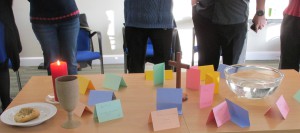I offer my neighbour the communion cup: ‘Tim, the blood of Christ, shed for you’.
How does a Buddhist Quaker come to be offering this sacrament to an evangelical church minister?
We were towards the end of a two day retreat for Christian leaders from Watford. The flier for the retreat read:
We are used to enjoying each other’s company. We respect each other’s traditions. We know, however, that there are some issues which could destabilize our underlying unity. We believe that our unity is strong enough for us to be able explore together some of these issues, and to listen, empathise and learn from each other.
Or, as one person interpreted it ‘talks about talks’, but not shying away from the fact that there are things we disagree about. I’ll write more in another blog post, here I want to dwell on the communion ritual.
How was it that I felt able to participate whole-heartedly?
The moderator of Christians across Watford, Tim Roberts, who has a passion to see a united church in the town, serving the town, introduced the session, explaining that the holy communion, eucharist, mass, whatever we call it, was celebrated by almost all Christians, but that we all had different understandings so no-one person among us could lead without making it difficult for another. Therefore we were all invited, if we wished, to share something of what it meant to us, listening carefully to one another.
An Anglican minster shared something of the diversity of views of the sanctity of the bread and wine within the Church of England – from not a drop or crumb must be left or spilt because it is so holy, to the youthful, joyful, carefree breaking of crusty loaves among the younger people at Soul Survivor.
A Roman Catholic priest shared a mystic view that could be taken, and that the rite could be understood on many different levels.
Some of the Baptists, Seventh Day Adventists and members of Community churches shared very personal understandings of Jesus’ death on the cross.
I spoke of my own understanding that we are asked to remember the last supper every time we do this ie every time we eat or drink together, and how, at home, we observed a silence before we ate and this, as well as gratitude, was a thing we tried to remember. Then I offered Quaker Faith and Practice 27.39:
To Fox and the early Friends the whole of life seemed sacramental, and they refused to mark off any one particular practice or observance as more sacred than others. They took the same stand with regard to Sunday, or First Day; it was not in itself more holy than Saturday or Monday; every week-day should be a Lord’s Day. Their whole attitude was gloriously positive, not negative. They were ‘alive unto God’ and sensed him everywhere.
We do not say that to observe the sacraments is wrong, but that such observance is not essential to wholehearted Christian discipleship and the full Christian experience. We do not judge our fellow Christians to whom the outward sacraments mean so much. Rather do we wish, by prayerful fellowship with them, to be led unitedly with them to a deeper understanding of what underlies those sacraments, and so to share a richer experience of the mind of Christ. Gerald K Hibbert, 1941
When we had heard from all who wished to speak, we moved on to the ritual, passing the bread and wine from one to another around our circle, each using a form of the traditional words that they felt comfortable with. It was very inclusive and uniting. It felt altogether appropriate for me to join in. We were respecting, learning more about, and even celebrating, our differences. I hope that we can spread this attitude to difference further into our respective communities, among the Christians, and reaching out to other faith groups.



Pingback: C is for Christians Across Watford Retreat | Stephanie's blog